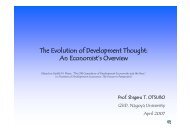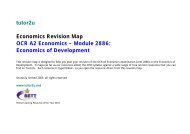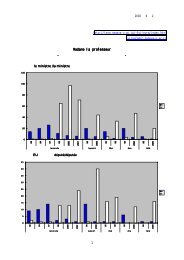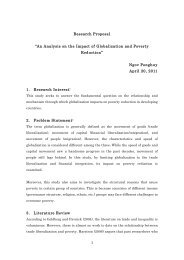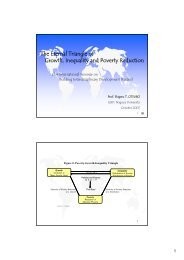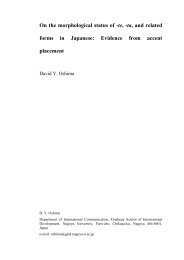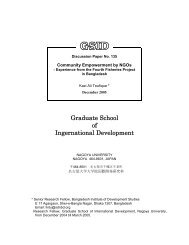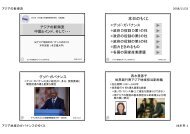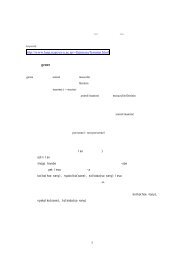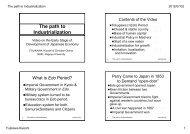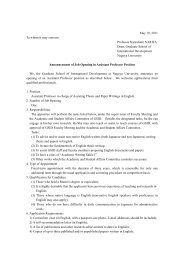Report
Report
Report
Create successful ePaper yourself
Turn your PDF publications into a flip-book with our unique Google optimized e-Paper software.
Preface<br />
Our consultations with senior policy-makers and think<br />
tanks in the region, over the past few years had<br />
underlined the need for a comprehensive quantification<br />
of the benefits from regional cooperation in South Asia,<br />
in order to build greater confidence in the SAFTA<br />
process and combat the negative perceptions about its<br />
outcomes. This study was consequently initiated by<br />
ADB’s India Resident Mission in partnership with<br />
UNCTAD in 2006. We would like to particularly<br />
acknowledge the role of Veena Jha, former coordinator<br />
of the UNCTAD India program, for readily agreeing<br />
to join the study and seeing it through its early phases.<br />
The main conclusion of the study, carried out over<br />
a period of one-and-half years, is that SAFTA will<br />
continue to contribute to stronger economic growth<br />
in the region. The result is corroborated by a variety<br />
of modelling techniques that have been employed to<br />
overcome the shortcomings of using one methodology<br />
alone. An optimistic scenario is revealed with SAFTA –<br />
although some sectors lose and some sectors gain in<br />
each country – a result in contrast to earlier studies.<br />
The welfare gains from trade in goods arise on account<br />
of improvements in complementarity within the region<br />
over the past few years, implying the fact that exports<br />
of countries are becoming increasingly regional. The<br />
study also clearly establishes that gains are much higher<br />
if efficient systems are simultaneously established for<br />
regional trade, transportation, and infrastructure.<br />
Consultation seminars were organised by leading<br />
think-tanks in the region to seek views from all<br />
stakeholders, including senior policy-makers, industry<br />
representatives, and academia. Seminars were held<br />
across five South Asian capitals, with representation<br />
from all eight countries, starting at Colombo in March<br />
and concluding at Islamabad in May this year. We<br />
received excellent feedback from each of these seminars<br />
which has been incorporated into this final version of<br />
the report.<br />
We wish to acknowledge our deepest appreciation<br />
for the efforts of Saman Kelegama, Executive Director,<br />
Institute of Policy Studies, Colombo; Manab<br />
Majumdar, Senior Director, Federation of the Indian<br />
Chambers of Commerce and Industry, New Delhi;<br />
Mustafizur Rehman, Executive Director General, Centre<br />
for Policy Dialogue, Dhaka; Navin Dahal, Executive<br />
Director, South Asia Watch on Trade, Economics,<br />
and Environment, Kathmandu; and Safdar<br />
Sohail, Director General, Foreign Trade Institute of<br />
Pakistan, Islamabad and the efforts of their teams who<br />
were instrumental in organizing these consultations.<br />
We also wish to place on record our gratitude to<br />
SAARC Secretary-General Sheel Kant Sharma and<br />
Director, Trade, Vinay Kwatra for sparing valuable time<br />
to discuss the Study at Kathmandu. We hope this work<br />
will be of use to the SAARC Secretariat and member<br />
countries in taking SAFTA forward.<br />
Kunio Senga<br />
Director General, South Asia Department, ADB




